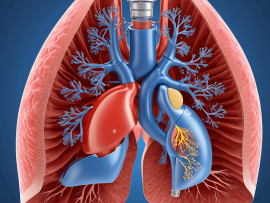Abstract Background Extracorporeal membrane oxygenation (ECMO) has emerged as a crucial tool in the care of patients with multiorgan failure and is increasingly utilized as a bridge to transplantation. While..
Read MoreAbstract Introduction Extracorporeal membrane oxygenation (ECMO) is a high-risk treatment but the legal risk surrounding its use is unknown. Methods Retrospective review of the Westlaw legal database was used to..
Read MoreAbstract Background Preliminary evidence from small, single-center studies suggests levosimendan may improve the likelihood of successful venoarterial extracorporeal membrane oxygenation (VA-ECMO) weaning in patients with cardiogenic shock. However, the literature..
Read MoreAbstract The National Institute of Health (NIH) recommends that healthcare education material be written at a 6th–7th grade reading level. There are yet to be studies that investigate the readability..
Read MoreAbstract Introduction Venoarterial extracorporeal membrane oxygenation (VA-ECMO) is an essential life-support system in critical care specifically engineered to assist cardiac and respiratory function by externally maintaining blood perfusion and oxygenation..
Read MoreAbstract Background/Objectives: Brain ischemia is a frequent complication in patients undergoing veno-arterial extracorporeal membrane oxygenation (va-ECMO) therapy due to hypoperfusion, low oxygenation, and thromboembolism. While concomitant intra-aortic balloon pump (IABP) therapy..
Read MoreAbstract Background/Objectives: Conventional cardiopulmonary resuscitation (CCPR) has been the foundational resuscitation approach for decades. Where CCPR is unsuccessful, extracorporeal membrane oxygenation-assisted CPR (ECPR) may improve outcomes. Predicting failure of CCPR..
Read MoreAbstract Extracorporeal membrane oxygenation (ECMO) is a rapidly growing resource for the most critically ill patients with respiratory and/or circulatory failure. [1,2] ECMO is one of the most resource intensive..
Read MoreAbstract Background Among patients reliant on continuous-flow (CF) mechanical circulatory support devices, bleeding is primarily caused by an acquired von Willebrand factor (vWF) deficiency, precipitated by the high shear stress..
Read MoreAbstract Background and aims: The effect of veno-arterial extracorporeal membrane oxygenation (VA-ECMO) on left atrial pressure (LAP) in the presence of interventricular interaction and the Frank–Starling mechanism is unknown. We..
Read MoreAbstract Background: We evaluated the impact of noninvasive respiratory support (NRS) and invasive mechanical ventilation duration before venovenous extracorporeal membrane oxygenation (VV-ECMO) on weaning from venovenous ECMO and survival. Methods: In..
Read MoreAbstract Background Traditional decannulation of femoral venoarterial (VA) extracorporeal membrane oxygenation (ECMO) involves femoral cutdown. Percutaneous methods have been developed, but data supporting their use are limited. This study sought..
Read MoreAbstract Sickle cell disease (SCD) is associated with substantial morbidity and early mortality in afflicted adults. Cardiopulmonary complications that occur at increased frequency in SCD such as pulmonary embolism, pulmonary..
Read MoreAbstract Purpose Sparse data exist on delirium in VA-ECMO. We aim to describe the characteristics, risk factors, and outcomes of delirium in VA-ECMO. Methods We retrospectively reviewed adults’s electronic medical..
Read MoreAbstract Venopulmonary ECMO (VP ECMO) is an advanced support strategy for patients with severe respiratory failure and right ventricular (RV) dysfunction, providing pulmonary protection by oxygenating blood and unloading the..
Read MoreAbstract Extracorporeal Membrane Oxygenation (ECMO) use is associated with substantial psychiatric morbidity in patients and their families. This systematic review and meta-analysis quantifies the prevalence of post-traumatic stress disorder (PTSD),..
Read MoreAbstract Whether an anticoagulation strategy combining bivalirudin and aspirin during extracorporeal membrane oxygenation (ECMO) would prolong oxygenator use is unknown. No clear data exist on oxygenator life span during prolonged..
Read MoreAbstract Nosocomial infections are one of the most frequent complications of extracorporeal membrane oxygenation (ECMO) and are associated with increased mortality (). Bloodstream infections present a particular problem because of..
Read MoreAbstract Predictive scoring systems for adult patients receiving extracorporeal membrane oxygenation (ECMO) support for sepsis have not been yet reported. Based on the Chinese Society of ExtraCorporeal Life Support (CSECLS)..
Read MoreAbstract Patients undergoing liver transplantation infrequently require extracorporeal membrane oxygenation (ECMO) support. However, when ECMO is required in the peritransplant period, several key considerations are required to maximize the efficacy..
Read MoreAbstract Background The use of venoarterial extracorporeal membrane oxygenation (VA-ECMO) as a cardiocirculatory support has tremendously increased in critically ill patients. Although fluid therapy is an essential component of the..
Read MoreAbstract BACKGROUND: Critically ill patients who receive circulatory or respiratory assist using extracorporeal membrane oxygenation (ECMO) may develop hemolysis, which can complicate the delivery of supportive care and be a..
Read MoreAbstract Background Hemolysis is a common complication in critically ill patients with sepsis, acute respiratory distress syndrome (ARDS) or therapy with extracorporeal membrane oxygenation (ECMO). Heme degradation product bilirubin might..
Read MoreAbstract Background Hospital-acquired infections (HAIs) are associated with morbidity and mortality in children following congenital cardiac surgery. Our center performs approximately 200 congenital surgeries a year, but infection rates and..
Read MoreAbstract Veno-venous extracorporeal membrane oxygenation (ECMO) is a life-saving technique in the armamentarium of critical care medicine. It involves extracorporeal blood circulation outside the body, providing temporary respiratory support while..
Read MoreAbstract Introduction: Hemolysis, characterized by increased carboxyhemoglobin (COHb) and methemoglobin (MetHb) levels, is a complication of extracorporeal membrane oxygenation (ECMO). Methods: This prospective single-center study aimed to investigate the correlation..
Read MoreAbstract Background and objectives Venous-Arterial Extracorporeal Membrane Oxygenation (VA-ECMO) is a pivotal means for rapid cardiopulmonary support, yet it may result in lower limb ischemia. This study aims to explore..
Read MoreAbstract Objectives Our objective was to explore the effects of extracorporeal membrane oxygenation (ECMO) on the pharmacokinetics of dexmedetomidine hydrochloride via vitro and in vivo experiments Design A single-center animal..
Read MoreAbstract Extracorporeal membrane oxygenation (ECMO) is commonly used for critically ill patients and associated with high rates of kidney injury and mortality. This study aimed to assess the impact of..
Read MoreAbstract OBJECTIVES The study’s aim was to investigate the outcomes and risk factors for mortality in patients undergoing surgery for acute type A aortic dissection receiving concomitant venoarterial extracorporeal membrane..
Read More















